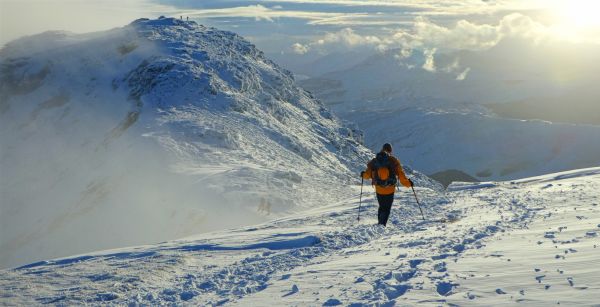My Walk of Life - Louisa Adjoa Parker

Image © Robin Mills
What happens when chronic illness takes your connection to nature away? Lifelong walker Louisa shares her experience of living with myalgic encephalomyelitis (ME)
Spending time in the natural environment is one of my favourite things, as well as being a coping strategy throughout my life. Although, due to my English-Ghanaian heritage, my face didn't 'fit' against a rural backdrop, I nevertheless found peace being in green or coastal spaces.
Aged 12, I moved with my mum and siblings to red-earthed south Devon. My mum didn't drive, so as a teenager I walked everywhere - alone or ambling with friends, inhabiting the rural space I lived in like a second skin.
At 19, I moved to Lyme Regis, Dorset, with my baby. As my family grew, we walked: to the beach, along the river, through fields and down country lanes. I walked to get to places but also for joy. I especially loved Monmouth Beach where I'd walk over pebbles next to the glittering sea. Being in that vast, historic, salt-licked space gave me time to reflect.
But fatigue, brain fog, headaches and pain stripped away that joy. In 2010, after years of blood tests and telling doctors I was beyond exhausted, I was diagnosed with ME. I was partly relieved - I wasn't just 'lazy' or 'depressed'. There was, however, no medication or cure. I was simply told 'pace yourself ' and 'rest'.
My world had shrunk to a bed in a darkened room. Light hurt my eyes and noise hurt my head. Although exhausted, I struggled to sleep. One afternoon, as my husband drove us through Dorset, I stared through the car window at great bowls of green land and thought, 'I'm no longer in the world.' I felt bereaved.
At the time, we didn't have a garden. I'd look from my bedroom windows through half-closed blinds. On one side was a red-bricked building and on the other, a sea of roofs and a sliver of sky. I longed to see something green. There was a park next door, but I didn't feel up to being in public, being seen. Although the river and fields weren't far away, I was disconnected from the landscape I lived in.
There was little understanding of ME when I was ill - although things have improved recently, partially due to the emergence of long Covid with similar symptoms. It hurt that people didn't seem to care about the thousands of ME patients lying in darkened rooms. It hurt when people joked that I was 'lazy' or said I was 'just tired'.
Yet humans are resilient: we can adapt, heal and survive. Several things helped me to recover. Firstly, acceptance and hope - yes, I was unwell now, but this could change - as well as rest, time, dietary changes, yoga, and addressing vitamin and mineral deficiencies.
My recovery from the depths of illness happened quickly. In January 2013, I went out with friends, but within minutes I told them I had to leave; the venue was too loud. That July, I went out for my friend's birthday. We sat in the sunshine in a beer garden, before going to a cocktail bar and dancing. 'You're so much better,' my friend said. 'In January, you couldn't have done this.'
But everyone is different. Many people with ME don't make a full 'recovery'. Sometimes we simply learn to live well with illness.
Today, I'm somewhat better, although the fatigue never completely left and as I hurtle towards menopause I'm experiencing chronic pain. I can work, but sometimes I don't have the energy for anything else. I have days when I'm out walking, moving across the earth, feeling the sun on my skin, noticing the birds and plants. And I have quiet days, when I stay home, perhaps stepping briefly into our untamed garden, or glancing through the window at people walking past and thinking 'not today'.
To anyone diagnosed with a chronic fatigue condition, I'd say don't give up hope of finding a version of wellness that fits you. Meanwhile, you can still engage with nature. Sit outside, look up at the sky. Fill your home with plants. Listen to nature sounds.
For those supporting others experiencing chronic fatigue, listen to that person's story. Find out what they need and dig deep into your empathy well: a little goes a long way.
Louisa is a contributor to Moving Mountains, a new anthology of nature writing by authors living with chronic illness and disability (£16.99, Footnote Press, ISBN 9781804440537).

Walk & talk: Sarah Beeny
The TV property expert, author and entrepreneur on her love of farm-life, family and forest walks, and how connecting with nature helped her through treatment for breast cancer.

The wonders of winter wanders
Rambling in the snow, frost or pelting rain isn’t just exhilarating – it unveils nature’s seasonal spectacles, and has great health benefits too.

Masterclass – Good in an emergency
Stay safe this season with expert advice on walking in wintry conditions and what to do in an emergency, from our friends at AdventureSmart.